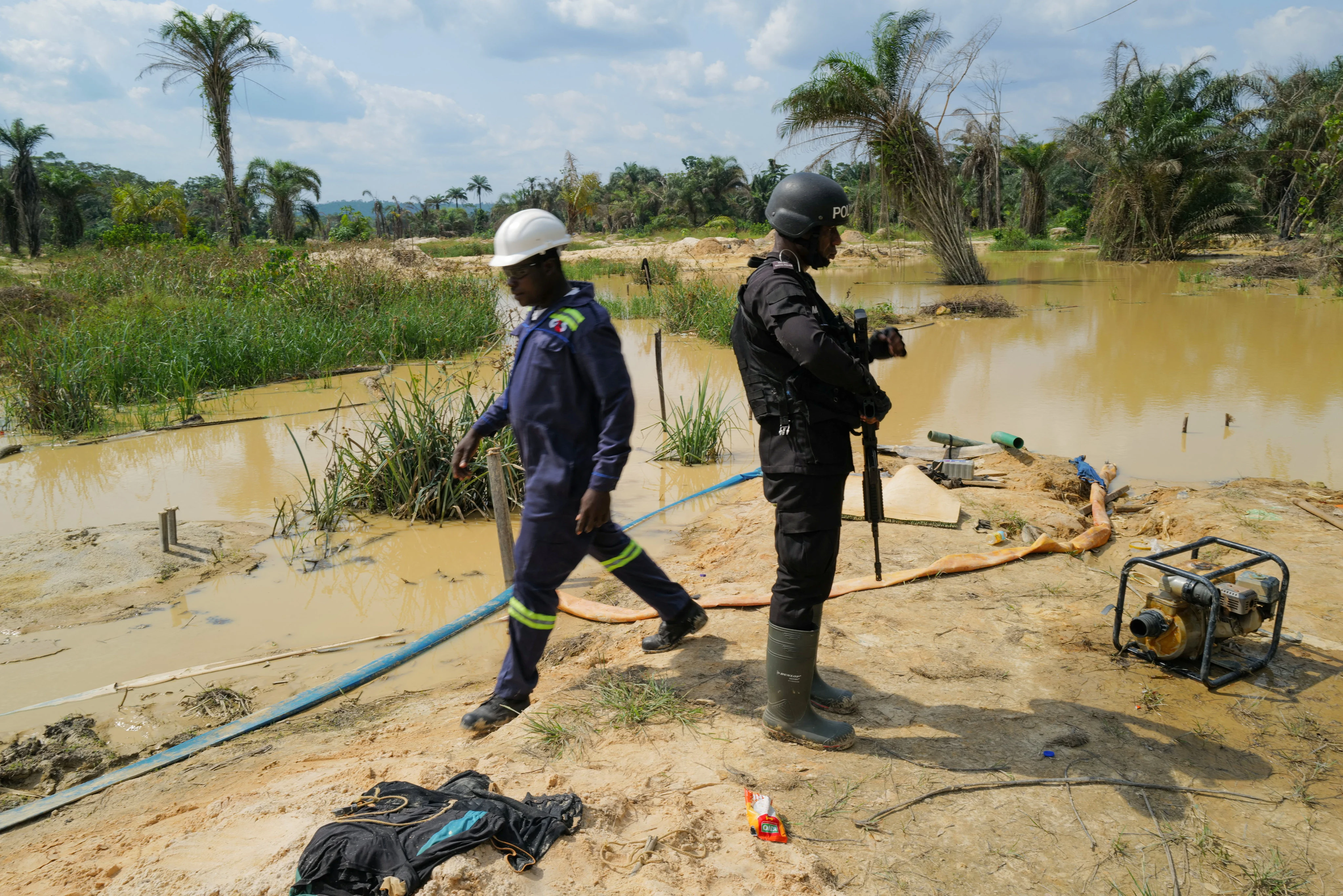By Jevans Nyabiage
China and Ghana, Africa’s largest gold producer, are embroiled in a diplomatic row over the rampant problem of illegal gold mining, known as “galamsey”.
As global gold prices soar, a growing number of Chinese firms are investing billions of dollars in Ghana’s lucrative gold sector. However, the alleged involvement of Chinese nationals in illicit mining operations has ignited major debate.
It has prompted the Chinese ambassador to Ghana, Tong Defa, to push back against accusations that Chinese nationals are solely to blame for the illegal mining activity.
He said Chinese nationals could not obtain local mining licences and were often brought in by Ghanaians who facilitated the illegal mining operations.
“The issue did not originate from the Chinese. Some of those who are even caught red-handed are simply migrant workers trying to make a living,” Tong told local media in Ghana last week.
He said the “perception is unfair to me, personally, and to the majority of Chinese nationals here”.
“For instance, when I post on social media, comments often suggest that galamsey is entirely caused by China, which is a significant injustice,” Tong added.
His response follows crackdowns on illegal miners that led to the arrest of hundreds of miners, including dozens of Chinese nationals.
Environmentalists say illegal gold mining is damaging Ghana’s environment, especially in the gold-rich Western, Ashanti and Eastern regions, by contaminating the country’s vital rivers with toxic chemicals, while also rendering vast tracts of land barren through deforestation and soil degradation.
This rush for gold has also seen a rise in Chinese nationals seeking fortunes in the country’s mining sector, with many among them accused of engaging in illegal mining activities. It is widely reported in Ghana that the Chinese provide financial, technical and technological support to locals who are engaged in the act.
One of the most widely cited cases is that of Aisha Huang, known as the “Galamsey Queen” for her illegal mining operations in Ghana. She was sentenced in 2023 to 4½ years in prison and ordered to pay a US$4,000 fine following her return to the country after previously being deported to China.
But the Chinese envoy said it was crucial to acknowledge the massive contributions of Chinese entities across many sectors in Ghana. He said Chinese companies had built numerous buildings, roads and ports. “Yet, do ordinary Ghanaians truly recognise these efforts, or do they consistently associate us solely with galamsey?” Tong said.
Against this backdrop of illegal mining, Hanna Louisa Bissiw, the Administrator of Ghana’s Minerals Development Fund (MDF), vowed last week to crack down on illegal miners, including Chinese nationals.
“Let me be unequivocally clear: there will be no compromise on what we have to do. It’s an absolute ‘never’,” Bissiw said, referring to the ongoing arrests of illegal miners.
However, she said that during a visit to China, she was “encouraged by them to push forward” in anti-galamsey efforts, with China affirming readiness to provide support to fight the problem.
While some Ghanaian analysts have voiced support for the Chinese ambassador’s assertion regarding local complicity in galamsey, others strongly reject solely blaming Ghanaians or absolving Chinese nationals from responsibility.
Baffour Agyeman-Duah, a former senior governance adviser to the United Nations, told Ghanaian news outlets that if one observed the Chinese involved, most were rural and not highly educated.
“This suggests a deliberate system must be in place to recruit and transport them here without issues at immigration entry points, then bus them to these forests. This is highly unusual,” Agyeman-Duah said. He said this indicated some form of official collusion with whoever was contracted to bring these people.
However, Gladys Nyarko Ansah, a professor in the department of English at the University of Ghana and a co-principal investigator on a galamsey research team, said that the fact Ghanaians were also involved in illegal mining did not make it right for Chinese to engage in it.
“Is the ambassador saying that because some Ghanaians engage in stealing, Chinese migrants in Ghana should also engage in stealing?” Ansah said.
Ndubuisi Christian Ani, a senior researcher and project coordinator for ENACT: Enhancing Africa’s Response to Transnational Organised Crime, based at the Institute for Security Studies in Abuja, said Ghana recognised the tremendous contribution of China to its economy, but “criminal activities need to be dealt with as such to prevent impunity”.
“Over the years, Ghana tends to be lenient on arrested Chinese persons involved in illegal mining, partly because of its respect and high regard for China,” Ani said.
He said while it was critical to blame local enablers, Chinese involvement in illegal gold mining was not limited to Ghana but extended across the region, including Nigeria. He added that this highlighted the fact that they were organised, well-resourced, and keen on exploiting local vulnerabilities to achieve their goals.
